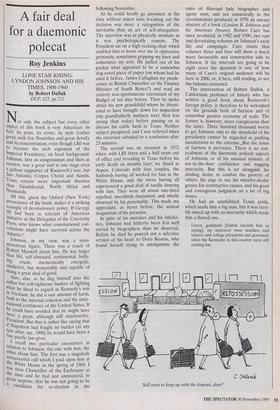A fair deal for a daemonic polecat
Roy Jenkins
LONE STAR RISING: LYNDON JOHNSON AND HIS TIMES, 1908-1960 by Robert Dallak OUP, £25, pp.721 Not only the subject but every other aspect of this book is very American: its feel, its print, its cover, its style (rather good, with few flourishes and great detail), and its concentration, even though LBJ was to become the arch exponent of the Imperial Presidency, on local background. Johnson, first as congressman and then as senator, was a great and at one stage even a gallant supporter of Roosevelt's war, but San Antonio, Corpus Christi and Austin, Texas remain more important theatres than Guadalcanal, North Africa and Normandy.
All this, given the Oxford (New York) provenance of the book, makes it a striking example of devolutionary policy. If George !II had been as tolerant of American Initiative as the Delegates of the University Press, who knows what constitutional con- volutions might have survived across the Atlantic?
Johnson, in my view, was a semi- monstrous figure. There was a touch of Robert Maxwell about him. He was larger than life, self-obsessed, sentimental, bully- 11,1g, crude, daemonically energetic, vindictive, but memorable and capable of doing a great deal of good. Also, alas, as he dug himself into the sullen but self-righteous bunker of fighting what he liked to regard as Kennedy's war in Vietnam, he did a vast amount of harm, both to the internal cohesion and the inter- national confidence of the United States. If he could have avoided that he might have been a great, although still unattractive, '. resident. But that is rather like saying that if Napoleon had fought no battles (at any rate after, say, 1800) he would have been a fine pacific law-giver. I recall two particular encounters in relation to Johnson, the one with him, the other about him. The first was a singularly unsuccessful call which I paid upon him at the White House in the spring of 1968. 1 w, as then Chancellor of the Exchequer at 'he time and he had just announced, to great surprise, that he was not going to be a candidate for re-election in the
following November.
As he could hardly go anywhere at the time without minor riots breaking out the decision was more a recognition of the inevitable than an act of self-abnegation. The interview was as physically intimate as it was psychologically remote. The President sat on a high rocking-chair which enabled him to loom over me in oppressive proximity, sometimes gripping my knee and sometimes my arm. He pulled out of his pocket what appeared to be a somewhat dog-eared piece of paper (on whom had he used it before, James Callaghan my prede- cessor as British Chancellor or the Finance Minister of South Korea?) and read an entirely non-spontaneous encomium of my Budget of ten days before. Then he spoke about his new grandchild whom he threat- ened to have brought down for inspection (my grandfatherly instincts were then less strong than today) before passing on to discuss his cattle herd in Texas. Neither subject prospered, and I was relieved when the interview subsided to a conclusion after 25 minutes.
The second was an occasion in 1972 when, with LBJ three and a half years out of office and brooding in Texas before his early death six months later, we dined in Aspen, Colorado with four couples, the husbands having all worked for him in the White House, and the wives having all experienced a good deal of tactile dancing with him. They were all about one-third repelled, two-thirds fascinated, and wholly obsessed by his personality. This made me appreciate, as never before, the animal magnetism of his presence. In spite of his mistakes and his infelici- ties, Johnson had hitherto been less well served by biographers than he deserved. Before he died he poured out a selective version of his heart to Doris Kearns, who found herself trying to amalgamate the roles of Harvard lady biographer and agony aunt, and not unnaturally in the circumstances produced in 1976 an uneasy mixture of a book (Lyndon B. Johnson and the American Dream). Robert Caro has since produced, in 1982 and 1990, two vast and devastating volumes on Johnson's early life and campaigns. Caro insists that volumes three and four will show a much more favourable and constructive side to Johnson. If the intervals are going to be eight years the question is one of how many of Caro's original audience will be here in 2006, or, if here, still reading, to see the balance corrected.
The intervention of Robert Dallek, a Californian professor of history who has written a good book about Roosevelt's foreign policy, is therefore to be welcomed on the grounds both of fairness and of somewhat greater economy of scale. The former is, however, more conspicuous than the latter. Three hundred thousand words to get Johnson only to the threshold of his presidency cannot be regarded as pushing succinctness to the extreme.,But the sense of fairness is pervasive. There is no con- cealment of the daemonic polecat aspects of Johnson, or of his unusual mixture of toe-in-the-door confidence and nagging insecurity. But this is set alongside his abiding desire to combat the poverty of others, his urge to use his wheeler-dealer genius for constructive causes, and his good and courageous judgment on a lot of big issues.
He had an uninhibited Texan pride, which made him a big man, but it was terri- bly mixed up with an insecurity which made him a flawed one.
Listen, goddamit [Dallek records him as saying], my ancestors were teachers and lawyers and college presidents and governors when the Kennedys in this country were still tending bar.
'Still want to keep up with the Joneses, dear?










































































 Previous page
Previous page